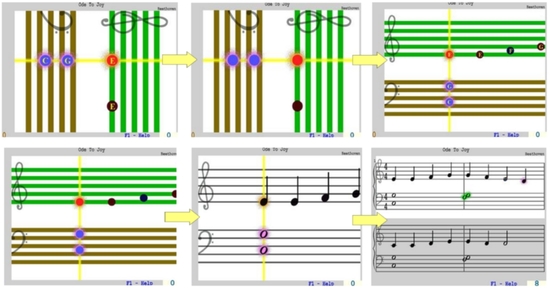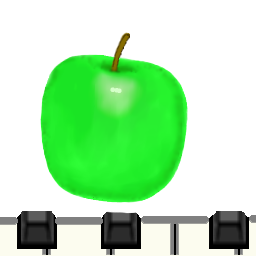Preparatory C (from 5+). Lesson 10

You FREE Demo version is here
You full version access is here
 Link to buy piano stickers is here
Link to buy piano stickers is here
How to build and maintain the motivation to learn music?

What motivates us to do anything? How to keep motivation and always be happy and excited to learn music and piano?
Here is what my thoughts are about it:
1. Your vision - the ability to see every note and key on the fly is the most powerful tool for motivation to learn how to play piano and read music.
You may ask your baby to push a button and pull a tune from an iPod - you may ask your baby to sit and perform any simple tune by oneself at the piano keys. The quality of the performance is probably very different and most likely not in your baby's favor.
But the quality of the IMPACT on YOUR child's mind will be much stronger if he will make the music and interpret it by himself. It is easy to do with our adjustable notation:
You as a parent will be able to choose the visual format that works the best for your child's eyes. It will be natural for you to gradually challenge by changing it for more complicated visual modes as your child progresses.
Most importantly, by MAKING music by himself his own body, heart and soul, he is participating in a process of changing his own life and fate.
He receives a very important message from his own subconscious: he is a master of his own life even when he is playing by notes written by another creator.
For children this is one of the most important lessons of their lives. It is no accident that Plato named music education the foundation of general study, and making music should be placed in front of all of the other subjects.
2. Surrounding.
Russians have a saying that a really educated person ought to have at least 3 diplomas: his, his parents and his grandparents.
Suggest to create a “cult of music education” in your/your students' homes. Do not be intimidated by the word “cult.” After the global pull back from music education, when music is gradually being squeezed out of public schools and pianos are given away for free to be replaced by pieces of furniture, it is time to swing the pendulum the other way.
Without a piano or even a digital keyboard, a home has no soul. This instrument has to have the most comfortable place in the house, accessible to all family members. This instrument should never collect any dust on it. If someone goes to play it, with or without headphones, everyone else should respect this creative act and never prevent it from happening.
3. Social communication.
Be encouraged to find “brothers in music making.” Carefully look around in your child’s day-care center or school. Are there any other parents who understand the importance of music education and whose child is taking piano classes?
Ask them: 'Do you enjoy meeting people?' Suggest to initiate some meetings – evenings – parties, where children and adults will play music pieces for each other.
Make it a tradition! Communicate, have fun, eat delicious food, let kids communicate with each other, too. Why don’t we add more flavor and meaning to your parties?
Such meetings can change the quality of your communication not just with other adults, but also with children – big time!
Start with a little recital. When your little “pumpkins” and you play music pieces prepared especially for the event, the bond between generations will become much stronger.
4. Virtual communication.
Internet communities. Interactive communication can also be a huge incentive for taking music lessons. We founded the Soft Mozart community (a forum and network) for people who want to receive a good effective music education.
Our experience proved to us how important is it to be heard and to have the ability to communicate while receiving a music education.
Even little children love to play for their peers from different countries as well as listen to their friends’ performances. They like to hear the pieces that they are learning as well as new ones. After that they suddenly say to their parents: “I am going to learn this song, too!”
5. Join our Soft Mozart community and share your You Tube videos. We developed our Academy with the goal of giving music educators not only an opportunity to communicate directly, but also to give a chance to get inspired by other learners and/or their parents.
By being in touch with people who care about music education and who wants the best for their children and themselves, our community members receive positive reinforcement and strengthen their own motivation.
We send each participant a Certificate of participation and special gifts to build the strong motivation to learn how to play piano and read music.
Our students and teachers are with us for years. The community is very knowledgeable and unique.
You will be amazed, how much your motivation to learn music and piano with us will grow over time. Just step in and say Hello!
..
1. Chromatic Scale with both hands in a parallel direction up and down:
Video Sample:
2. Keep practicing 5 fingers, Rainbow, Spookie Wind and Chromatic Scale in opposite motion.
3. Piano Hand Position Exercises by Olga Egorova: "Visiting hands". Keep mastering
 Guess Key®
Guess Key®
Keep working on the module.
Have your child sing each note. It will be possible to do this only when the child is comfortable with the module.
....

If your child is developing faster or slower than our plans suggest, we recommend writing to us at admin@softmozart.com to start working with our certified specialists.
1. Music sight-reading/sight-singing -
 Gentle Piano®- Nursery Songs Primer. Play and sing Jack and Jill - R1, R3, L1, L3, P1, P3
Gentle Piano®- Nursery Songs Primer. Play and sing Jack and Jill - R1, R3, L1, L3, P1, P3
Video sample:
2. Introductory Songs: "Jingle Bells"- S, R - RН, L-LН and P-PН
or - and
"A New Year's Tree".
Sample:
3. Keep working on the French Song. If you are doing good, make a video of performing the piece for your progress diary.
P. Tchaikovsky "Nutcracker". "Мarch":
Practice playing easy or more advanced ТEASER of the March.
1. Theater of Music Theory. "Heartbeat of Music" 1 part.
View the video. Find a place where "March" that you learn is used in the play.
2. Continue listening to the orchestral performance of the March.
3. Search and listen on the Internet for other interpretations of the work
....
Visit our Soft Mozart forum and start your progress diary here. Use the current year section. This is the place for you to ask questions and share your experiences.
At least 2 photos and 1-2 videos of the listed activities will count towards your child's credits for the graduation DIPLOMA. Please upload the video to You Tube, copy the address from the BROWSER window and paste it into your Progress Diary. Do not forget to indicate the year and type of work in the description of your Soft Mozart Academy photo / video.
Sincerely Yours,
Hellene Hiner

Video Success:
 Would you like to receive lessons by email weekly? Subscribe to the e-mail lesson here:
Would you like to receive lessons by email weekly? Subscribe to the e-mail lesson here:
All the lesson plans:
For 2+ students
For students from 3 to 5
For students 5+
Always check here, if we have any recital! You and your child will benefit a lot from participating in our concerts!
Your place to start your progress diary is here.

